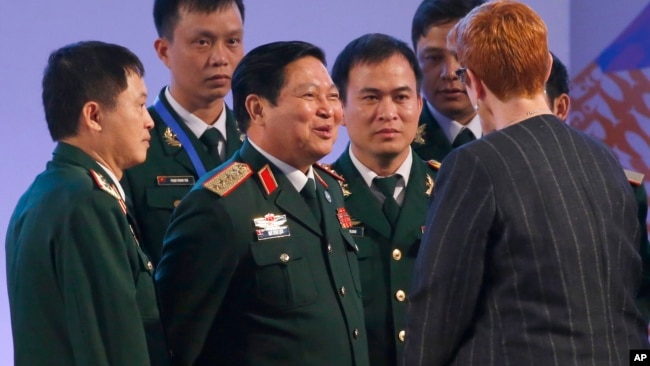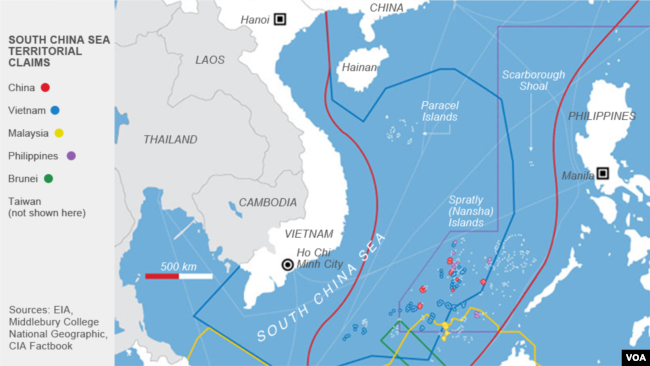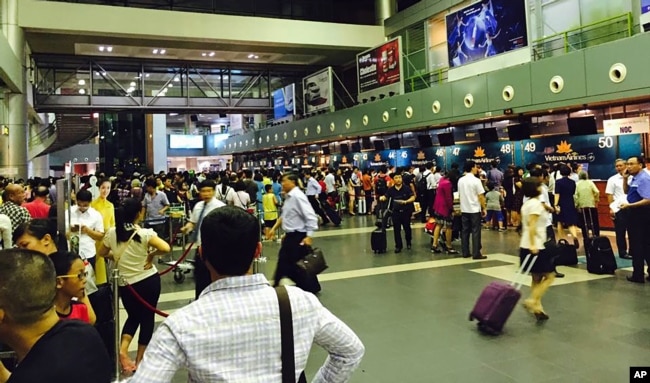TAIPEI —
Japan is helping Vietnam build a defense against the larger, more militarily powerful China as Vietnam says Beijing’s forces are occupying more than their legal share of the South China Sea.
Japanese Defense Minister Takeshi Iwaya and his Vietnamese counterpart, Ngo Xuan Lich, met May 3 to “advance cooperation” on maritime security, Tokyo-based NHK television online said.
In October, the ministers met in Tokyo to discuss issues surrounding the South China Sea. They signed a “defense cooperation and exchange” memorandum that prescribed regular vice ministerial-level talks, the Japanese defense ministry website says.
Japan has been jousting with China over sovereignty in parts of the East China Sea, including a chain of uninhabited islets coveted by fishing fleets.
“Essentially there is an arc of anxiety stretching from New Delhi to Canberra and Jakarta and Hanoi and Tokyo,” said Jeffrey Kingston, history instructor at Temple University, Japan Campus. “So, I think that perhaps the rhetoric is aimed at signaling that there are collective, shared concerns that are leading towards a collective response.”

Japan-Vietnam exchanges
An agreement between the two countries opened the way for more Japanese ports of call in Vietnam, as well as technical cooperation on defense equipment for Vietnamese maritime surveillance, NHK reported.
It’s unclear how much Japan will donate to Vietnam directly, Kingston said. Japan’s public generally doesn’t support a more “assertive strategic” role for their government, he added, though a lot of people feel a “good vibe” toward Vietnam compared to China. Japanese laws also limit arms sales to other countries.
Japan could set up military exchanges, hold strategic dialogue and offer “naval defense equipment,” said Murray Hiebert, deputy director of the Southeast Asia Program at the Center for Strategic and International Studies in Washington.
“Vietnam is looking to Japan as a hedge as China militarizes the South China Sea, puts more pressure on Vietnam in their areas of dispute and presses Hanoi to abandon oil exploration activities, including on Vietnam’s continental shelf,” Hiebert said.

Sino-Vietnamese spats
Beijing claims about 90% of the 3.5 million-square-kilometer South China Sea, stretching from the island of Borneo north to Hong Kong.
China and Vietnam clashed there in 1974 and in 1988. Five years ago, the two sides rammed each other’s boats over the positioning of a Chinese oil rig in waters that Vietnam claims. The incident touched off deadly anti-China rioting in Vietnam. The two countries dispute undersea gas-exploration tracts as well as the Paracel Islands, which China now controls.
Brunei, Malaysia, the Philippines and Taiwan also claim sea tracts that China calls its own. Those governments value the waterway for its fisheries and undersea fuel reserves.
China raised alarms around Southeast Asia after 2010 by building up tiny islets for defense installations.
Japan began to step up support of its own interests around Asia. In 2017, an alliance including Japan, the United States, India and Australia began calling for China to leave the sea open for international use and increasing relations in Southeast Asia.
“The Japanese want to support the Vietnamese claims, but they don’t want to do it militarily,” said Stephen Nagy, senior associate politics and international studies professor at International Christian University in Tokyo. “What they’d rather do is build capacity, build interoperability and build a coalition of states that will stand by and try to enforce maritime law in the South China Sea.”

Evolving friendship
Japanese ties with Vietnam started more than two decades ago when investors took advantage of the country’s low wages. Japanese automakers and other investors launched 3,320 projects in Vietnam worth a combined registered capital of $42.5 billion as of 2016.
Partly to support its industry and partly to offset Chinese economic influence in Southeast Asia, Japan now funds infrastructure projects in Vietnam.
A Japanese loan built the airport terminal in Hanoi, and Japanese aid funded the subway system being constructed in Ho Chi Minh City. Japanese official development aid to Vietnam had totaled 2.8 trillion yen ($25.5 billion) by 2016.
“I think these (military) actions expand the original economic field into the political field,” said Tai Wan-ping, Southeast Asia-specialized international business professor at Cheng Shiu University in Taiwan. “Japan’s military performance in Southeast Asia wasn’t proactive in the past.”Comments sorting:
This is a demo advert, you can use simple text, HTML image or any Ad Service JavaScript code. If you're inserting HTML or JS code make sure editor is switched to "Text" mode.
I don’t know whats going on. Didn’t Vietnam have its rail system built by China?
Basically, China is increasingly being belligerent towards her neighbors, that’s why alliances are forming against her.